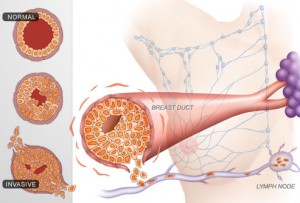
While removing the other healthy breast does reduce the risk that breast cancer will develop in that breast, most women diagnosed with early-stage breast cancer who don’t have an abnormal BRCA1 or BRCA2 gene or a strong family history of breast cancer have a low risk of cancer developing in the other breast – about 0.5% to 0.75%. Also, this risk goes down over time for women who get adjuvant treatments. Adjuvant treatments are treatments given after surgery to lower the risk of breast cancer coming back or a new breast cancer developing. Adjuvant treatments include radiation therapy, hormonal therapy medicines, chemotherapy medicines, and targeted therapy medicines.
In this study, the researchers surveyed 1,447 women who had been diagnosed with early-stage breast cancer either between June 2005 to February 2007 or June 2009 to February 2010. None of the women had had a recurrence.

The researchers found:
- about 75% of the women said they were very worried about the breast cancer recurring
- about 19% of the women strongly considered having contralateral prophylactic mastectomy
- 7.6% of the women had contralateral prophylactic mastectomy
- about 70% of the women who had contralateral prophylactic mastectomy had no family history of breast cancer and didn’t have an abnormal BRCA1 or BRCA2 gene
- 80% of the women who had contralateral prophylactic mastectomy said they had the procedure to prevent breast cancer in the other breast
When you’re first diagnosed with breast cancer, fears about the future can affect how you make decisions. This is especially true for women who have an abnormal breast cancer gene or who have watched a mother or sister be diagnosed with breast cancer. You have to make a number of decisions at a very emotional time when it can be hard to absorb and understand all the new information you’re being given.
Specialized Hospitals support every woman’s right to make treatment decisions based on the characteristics of the cancer she’s been diagnosed with, her medical history, her risk of recurrence or a new breast cancer, and her personal preferences. But it’s very important to make sure you understand all the pros and cons of any treatment or procedure you’re considering, including how the treatment or procedure may affect your reconstruction options and if the treatment is likely to make you live longer.
If you’ve been diagnosed with early-stage breast cancer, ask your doctor about ALL of your treatment and risk reduction options. Contralateral prophylactic mastectomy is only one of these options and is an aggressive step. While it may be the right decision for you, give yourself the time you need to consider the decision carefully. It’s a good idea to talk to your doctor about how the details in your pathology report may affect your future risk. You want to be sure that your decisions are based on your actual risk of recurrence or a new cancer. Make sure you understand the benefits and risks of all your options. Together, you and your doctor can make the choices that are best for you and your unique situation.
For more information on Breast Cancer Treatment please visit : https://safemedtrip.com/medical-services/cancer-treatment-in-india/breast-cancer-surgery-in-india.html

 Click to WhatsApp
Click to WhatsApp +91-9899993637
+91-9899993637



